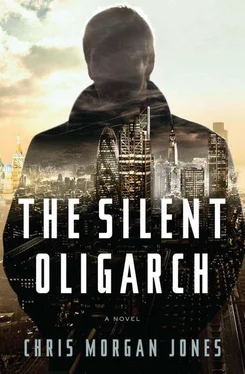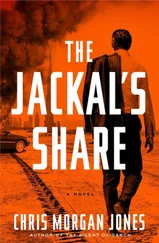Tourna looked up from his bowl and stopped eating. “You want to look inside, huh?” His forehead creased as he raised his eyebrows. “You want this work or not?”
Webster smiled. “We’re busy. It’s all the same to me.”
“OK,” Tourna said with a dry laugh, and took them off. His eyes were a flat brown, the skin around them slightly lighter than the rest of his face. “This is more fun than I expected.”
Webster saw something heated, something childish in Tourna’s gaze: he gave the impression of being ill-equipped to deal with reverses. He kept his smile but didn’t say anything. For a moment the two men looked at each other.
“Tell me about Malin,” said Webster.
Tourna nodded to himself again and took a deep breath.
“He sold me a company. Well, one of his stooges did. It was meant to own a package of exploration licenses. Some oil, some gas, all in Yamal-Nenets. We did the due diligence and everything was fine. Then when the deal’s done, the licenses aren’t there. They’ve been transferred to another company. Incorporated in Cayman two months before. It had some made-up option on them.”
“How much did you pay?”
“Fifty million. Bucks. That was my money, too.”
Webster nodded. “And you want the licenses back.”
“No. I’ve had it with Russia. Should have known better. I want my money back. But that’s not why you’re here. I have lawyers for that.”
Webster waited. Tourna looked him in the eye.
“What I want from you,” he went on, “is the downfall of Konstantin Malin. The man is a crook. He’s meant to be the great strategist. The grand vizier, the man who made Russia powerful again. But all he cares about is his empire, and his money. He’s a fat crook, and he doesn’t deserve any of it. I want him gone.”
Webster said nothing for a moment. He could feel excitement rising in him, in his shoulders and his chest. A chance to take on Malin. This was worth coming here for. This was even worth the waiting.
“What do you mean by gone?”
“Out of the ministry. Humiliated. Under investigation in a dozen countries. I want him strung up from a lamppost.”
“I see. And how would we do that? He’s a powerful man.”
“I was hoping to hear your ideas.”
“You must have pictured it.”
“Look, everything he does is bent. But he smells of roses. There must be so much dirt on this guy somewhere. We find it and we use it.” When Tourna talked, his lips, an unexpected pink against the tan, pushed out slightly. They, thought Webster, rather than the eyes, are what tell you not to trust him.
He nodded again. He took a notebook and a pencil from his jacket pocket.
“You mind?”
“No, get it all down. Just don’t lose it.”
For an hour Webster questioned Tourna about the story and all the people in it. When had all this happened? How had the deal come about? Had he met Malin? Who else had he dealt with?
By the time he had finished it was ten o’clock and he could feel the sun hot on his shoulders. There was a flight at three. He wanted to leave this place and think about what he had just heard.
“I think that’s everything. Thank you.” He looked at his watch. “I should go.”
“You’re not staying? Stay as long as you want. I could drop you in Bodrum tomorrow.”
“Thank you, no.”
Tourna stretched and put his hands behind his head.
“So do I pass?”
Webster smiled. “I don’t know. I’ll speak to my boss.”
“You think you can help?” said Tourna, looking up at Webster and shielding his eyes.
Webster thought for a moment.
“You’re asking a lot. If we take it on we’ll do the same.” It occurred to him as he said it that he would take this on for no money at all. This was the sort of case he had signed up for: the sort that makes a difference.
Tourna laughed. Webster went to collect his things and start the long journey back to London, thinking hard, imagining how this might work.
Malin. Quite a prize.
TOURNA HAD GIVEN Webster a thick file before he left. He read it on the plane—a breach of protocol, but the child asleep next to him was hardly likely to be interested.
In it were all manner of documents, carefully organized: news articles, company reports, transcripts of radio programs, photocopied excerpts from books. Throughout, passages had been marked in fluorescent ink and annotated with exclamation marks and energetic underlinings. Tourna had explained that this was his personal file: he had compiled much of it himself. The most substantial item was a report for a bank that was thinking of lending money to a Viennese company called Langland Resources. It had been written three years earlier by a competitor of Ikertu, but how Tourna had got hold of it wasn’t clear.
Webster began with the appendices; they were always more interesting. To his surprise he found two spravki there, one on Malin, one on a lawyer called Richard Lock who had sold Tourna the company. He wasn’t sure that he would ask for a spravka on Malin now, and even three years ago it would have carried some risk—perhaps no one had appreciated how much. No doubt all content had been officially approved.
Spravka simply meant “certificate.” Every area of Russian life had its spravki: you needed one to sell your house, to register with a doctor, to have a telephone installed, to import goods, to export goods, to secure a passport, to take one’s place at the university. In Webster’s world it meant a summary of a person’s life taken from Russian intelligence agencies, so routinely that while the practice was illegal the information itself was now a mere commodity. They were seldom a colorful read. Date of birth, job, immediate family, house, car, education, career. Business interests inside Russia, business interests outside Russia. Observations concerning career and character. Evidence of or speculation concerning wrongdoing. Speculation about sexuality (half the reports he had ever read concluded that, in a favorite, equivocal construction of Russian bureaucracy, “it was not excluded” that the subject was homosexual). A life narrowed to its basic coordinates and its susceptibility to blackmail or corruption. He was always impressed by the discipline required to be so reductive.
As a rule the more significant you were—the more wealthy, the more politically lively, the more trublesome—the longer and fuller your spravka . Every person living in Russia had a file, of course, but most contained little beyond mundane details gathered from other government departments. Anything richer or deeper suggested that at some point you had been the subject of attention from the intelligence authorities themselves, and through the blankness of the language it was sometimes possible to see the phone calls overheard, the neighbors quietly consulted, the bank accounts inspected, the lives slowly but inevitably opened up to view. Russia might feel itself diminished but in this easy power over its people it seemed hardly to have changed at all.
The rule broke down, though, on the largest scales: no oligarch or government minister would be so careless as to leave his file intact. Through money or influence his spravka would be edited and cleaned until it said little at all, the information it had once contained now so far inside the deep dark vault of the Russian state that only those equivalently powerful could ever get it out.
The first spravka he had ever seen, so many years before, was about Inessa; she had shown it to him herself. It began with bare paragraphs about her upbringing, her family, her education, but what she was proud of was the four or five pages describing her writing and the threat she posed to the Russian state. Someone, she had explained, was keeping an active watch on her: she was being taken seriously. All her articles were attached. Corruption in Togliatti, pollution in Norilsk, smuggling in Vladivostok, aluminum murders in Krasnoyarsk, workers striking in Rostov, Tyumen, Yekaterinburg, Tomsk: a sampler for Russia’s first free decade. Next to her Webster had felt like a dabbler.
Читать дальше












